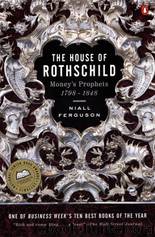The House of Rothschild: Money's Prophets, 1798-1848 by Niall Ferguson

Author:Niall Ferguson [Ferguson, Niall]
Language: eng
Format: epub, mobi
Tags: History
ISBN: 9780140240849
Publisher: Penguin
Published: 1999-11-11T08:00:00+00:00
However, when French troops were marching into Belgium to impose terms on the Dutch the following November, it was James’s turn to think twice when the Belgian minister approached him for a short-term loan of 10 million francs. “One must help these people,” he wrote somewhat wearily, “for, otherwise, they will simply not know what to do, and will only resort to stupid actions . . . In a word, these people . . . have no money and . . . don’t have the intelligence to make any money.” Belgium, he grumbled, was “a lousy country.” Only when it was apparent—and the assurances came from both Louis Philippe and Metternich—that the Dutch were diplomatically isolated and would have to acquiesce in the continuing Belgian occupation of Luxembourg and Limburg did the Rothschilds consent to the Belgian request. In partnership with the Société Générale, the Paris house now took more than half of a new issue of treasury bills. The decision to lend to the new state was, in many ways, a remarkable gamble, for the Rothschilds had no way of knowing that the diplomatic stand-off would end peacefully. But it was a gamble that paid off, not least because Belgium was to prove one of the dynamos of European industrialisation.
Poland was a different case, however. Although the Rothschilds had business links in Warsaw just as they had in Brussels, they were never seriously interested in the success of the Polish revolt. Expressions of sympathy aside—“poor Poles, I pity them,” wrote Charlotte to her mother—they did nothing to assist the revolt; on the contrary, as we have seen, they sought to lend money to Russia which would have been used to crush the revolt, and actually sold guns to St Petersburg.
In Italy too there was no question of assisting the revolution. Here, even before the political situation had been brought under control, the brothers arranged a £400,000 loan to the Papacy in partnership with an Italian banker named Torlonia. Perhaps more than any other Rothschild transaction of the 1830s, this loan fascinated contemporaries, who were in varying measures amused or appalled by the notion of a Jewish bank lending to the Holy See. Carl’s audience with the Pope in January 1832, for example, was widely commented upon. “Now things are getting at last into the order that God desired when He created the world,” sneered Börne:A poor Christian kisses the Pope’s feet; a wealthy Jew kisses his hand. If Rothschild had got his Roman loan at 60 per cent instead of 65 and so been able to give the cardinal-chamberlain another 10,000 ducats, he might have been permitted to fall on the Holy Father’s neck. The Rothschilds are assuredly nobler than their ancestor Judas Iscariot. He sold Christ for 30 small pieces of silver; the Rothschilds would buy Him, if He were for sale.
Download
The House of Rothschild: Money's Prophets, 1798-1848 by Niall Ferguson.mobi
This site does not store any files on its server. We only index and link to content provided by other sites. Please contact the content providers to delete copyright contents if any and email us, we'll remove relevant links or contents immediately.
| Military | Political |
| Presidents & Heads of State | Religious |
| Rich & Famous | Royalty |
| Social Activists |
Waking Up in Heaven: A True Story of Brokenness, Heaven, and Life Again by McVea Crystal & Tresniowski Alex(37003)
Empire of the Sikhs by Patwant Singh(22172)
We're Going to Need More Wine by Gabrielle Union(18072)
Hans Sturm: A Soldier's Odyssey on the Eastern Front by Gordon Williamson(16620)
Leonardo da Vinci by Walter Isaacson(11901)
The Radium Girls by Kate Moore(10907)
Educated by Tara Westover(7061)
Tools of Titans by Timothy Ferriss(6945)
How to Be a Bawse: A Guide to Conquering Life by Lilly Singh(6692)
The Last Black Unicorn by Tiffany Haddish(5075)
Permanent Record by Edward Snowden(4996)
The Rise and Fall of Senator Joe McCarthy by James Cross Giblin(4843)
Promise Me, Dad by Joe Biden(4447)
The Wind in My Hair by Masih Alinejad(4424)
The Crown by Robert Lacey(4105)
A Higher Loyalty: Truth, Lies, and Leadership by James Comey(4032)
The Iron Duke by The Iron Duke(3639)
Joan of Arc by Mary Gordon(3257)
How to be Champion: My Autobiography by Sarah Millican(3185)
